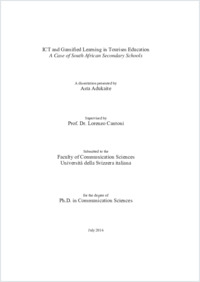ICT and gamified learning in tourism education : a case of South African secondary schools
- Adukaite, Asta
- Cantoni, Lorenzo (Degree supervisor)
-
19.10.2016
178 p.
Thèse de doctorat: Università della Svizzera italiana, 2016 (jury note: Summa cum laude)
Tourism education
secondary schools
information and communication technology
South Africa
gamification
technology acceptance
English
Tourism is often introduced as a subject in formal education curricula because of the increasing and significant economic contribution of the tourism industry to the private and public sector. This is especially the case in emerging economies in Asia and Africa (Hsu, 2015; Mayaka & Akama, 2015; Cuffy et al., 2012). Tourism in South Africa – which is the geographical setting of this research – is recognised as a key economic sector. At secondary level, tourism has been widely introduced at schools throughout South Africa since 2000 and has experienced significant growth (Umalusi, 2014). Furthermore, information and communication technology (ICT) has rapidly penetrated public and private sectors of the country. ICT affords novel opportunities for social and economic development, and this has especially been observed in the fields of both tourism and education (Anwar et al., 2014; Vandeyar, 2015). Yet, the many uses and implications of ICT for tourism education in South Africa are unclear and under-theorised as a research area (Adukaite, Van Zyl, & Cantoni, 2016). Moreover, engagement has been identified as a significant indicator of student success in South Africa (Council for Higher Education, 2010). Lack of engagement contributes to poor graduation rates at secondary and tertiary institutions in South Africa (Strydom et al., 2010; Titus & Ng’ambi, 2014). A common strategy to address lack of student engagement is introducing game elements into the learning process: the so-called gamification of learning (Kapp, 2012). The majority of research in this field has been conducted in more economically advanced and developed regions, and there is a paucity of research in emerging country contexts. It is argued that gamification can be effectively utilised also in these contexts to address learner engagement and motivation. This study aims to contribute in this respect: firstly, by investigating the extent to which ICT supports tourism education in South African high schools through the lenses of Technology Domestication Theory (Habib, 2005; Haddon, 2006) and Social Cognitive Theory (Bandura, 1977). Secondly, the study aims to examine gamified learning acceptance within tourism education in a developing country context. The research assimilates three separate studies. Study 1. The Role of Digital Technology in Tourism Education: A Case Study of South African Secondary Schools The study was designed as an exploratory analysis, based on 24 in-depth interviews (n=24) with high school tourism teachers and government officials. An analysis reveals that teachers recognize ICT as essential in exposing students to the tourism industry. This is especially the case in under-resourced schools, where learners do not have the financial means to participate in tourism activities. However, ICT is still limited in its integration as a pedagogical support tool. The major obstacles toward integration include: technology anxiety, lack of training, availability of resources, and learner resistance to use their personal mobile devices. Study 2. Raising Awareness and Promoting Informal Learning on World Heritage in Southern Africa. The Case of WHACY, a Gamified ICT-enhanced Tool The goal of the study was to present the World Heritage Awareness Campaign for Youth (WHACY) in Southern Africa. A campaign was dedicated to raise awareness and foster informal learning among Southern African youth about the heritage and sustainable tourism. The campaign employed an online and offline gamified learning platform, which was supported by a dedicated website, Facebook page, wiki and offline materials. In one year of operation the campaign reached more than 100K audience. For the evaluation of the campaign, a mixed methods approach was used: focus groups with students (n=9), interviews (n=19) and a survey with teachers (n=209). The study attempted to assess user experience in terms of engagement and conduciveness to learning and explored the possibility of a gamified application to be integrated into the existing high school tourism curriculum. The perspectives of South African tourism students and teachers were here considered. Study 3. Teacher perceptions on the use of digital gamified learning in tourism education: The case of South African secondary schools. The study is quantitative in nature and investigated the behavioural intention of South African tourism teachers to integrate a gamified application within secondary tourism education. Data collected from 209 teachers were tested against the research model using a structural equation modelling approach. The study investigated the extent to which six determined predictors (perceptions about playfulness, curriculum relatedness, learning opportunities, challenge, self-efficacy and computer anxiety) influence the acceptance of a gamified application by South African tourism teachers. The study may prove useful to educators and practitioners in understanding which determinants may influence gamification introduction into formal secondary education.
- Language
-
- English
- Classification
- Economics
- License
-
License undefined
- Identifiers
-
- RERO DOC 277719
- URN urn:nbn:ch:rero-006-115632
- ARK ark:/12658/srd1318723
- Persistent URL
- https://n2t.net/ark:/12658/srd1318723
Statistics
Document views: 763
File downloads:
- Texte intégral: 773
